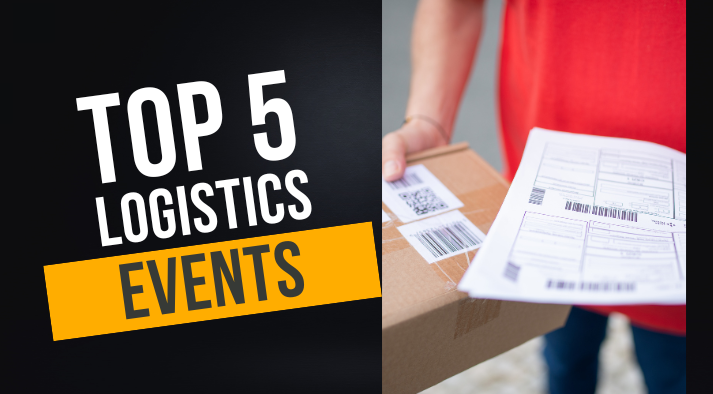
Home | Archives for January 2025



CLDA Members are encouraged to share news about their company. CLDA may share on social media, in newsletters or on the website.

Ready to share your news with CLDA or the industry media? Learn from these tips and tricks on how to get noticed.

Some of the best logistics conferences might not even be on your radar but they are some of the best investments you can make in your business. Final mile logistics is a fast-growing sector, driven by e-commerce, shifting consumer demands, and technological advancements. Whether you’re a carrier, 3PL, shipper, or technology provider, attending industry-leading conferences can help you stay ahead, build valuable connections, and discover innovations shaping the future of last-mile delivery.
📍 San Diego, CA | February 19-21, 2025
🔗 Register Now
If you’re in last-mile logistics, the Final Mile Forum (FMF) is the must-attend event of the year. Hosted by the Customized Logistics and Delivery Association (CLDA), FMF is the go-to conference for an unparalleled opportunity to gain the cutting-edge tools and invaluable resources necessary for driving growth and maximizing profitability. This annual gathering of industry leaders, innovators, and experts offers a unique platform for networking, knowledge sharing, and industry education. Don’t miss your chance to be part of an event that can transform your business.
✅ Unmatched Networking – Meet decision-makers from leading final mile logistics companies.
✅ Industry Insights – Stay ahead of regulatory changes, market trends, and innovation.
✅ New Business Growth – Explore strategic partnerships and revenue opportunities.
✅ Learn What Shippers Want – Hear directly from shippers on what they want from carriers and how you can gain their business.
✅ Technology Showcase – Discover the latest in route optimization, automation, and gig economy logistics.
If you’re looking to grow your final mile business and build industry connections, FMF should be your top priority. Join CLDA for member-discounted rates!
📍 Philadelphia, PA | June 4-5, 2025
Home Delivery World focuses on the future of e-commerce logistics, final mile delivery, and urban fulfillment. This event brings together retailers, 3PLs, and technology providers to explore cost-effective, fast, and sustainable last-mile solutions.
If you’re in parcel delivery, on-demand logistics, or urban distribution, Home Delivery World is a valuable event.
📍 Las Vegas, NV | February 10-12, 2025
Manifest is one of the fastest-growing conferences in supply chain and logistics innovation. This event brings together startups, investors, logistics leaders, and technology providers to discuss the future of freight, final mile delivery, AI, automation, and sustainable logistics. As a CLDA collaboration partner, CLDA members are eligible for discounted registration.
For professionals looking to explore the future of logistics and emerging technologies, Manifest is a great event.
📍 Chicago, IL | September 8-10, 2025
PARCEL Forum is tailored for final mile and parcel logistics professionals, focusing on improving carrier relationships, cost reduction strategies, and delivery optimization. If your business deals with parcel shipping, e-commerce fulfillment, or regional logistics, this event offers critical insights.
If you’re in parcel delivery, DTC fulfillment, or e-commerce logistics, this is the event to attend.
📍 Dallas, TX | March 2-4, 2025
Final mile doesn’t just happen on the ground—air freight is a crucial component of last-mile logistics. The AirCargo Conference brings together freight forwarders, cargo airlines, 3PLs, and final mile providers to discuss strategies for seamless multimodal logistics.
If your business involves expedited logistics, time-sensitive shipments, or air-to-ground final mile delivery, this conference provides valuable insights.
If you’re in final mile logistics, these events offer high-impact networking, business growth opportunities, and cutting-edge technology showcases.
📌 Want to stay ahead in final mile logistics? Register for the Final Mile Forum today! Your next deal could be there, will you?
| Welcome to Thinking Outside the Box, a new series of posts about trends impacting those involved in the final-mile. Every month, we’ll interview one of our industry’s thought leaders to give you their insights into where the industry is now and how CLDA members can succeed today, tomorrow and in the future. |

“It’s not just about technology for the sake of technology, but technology for the sake of making life better,” Guru Rao.
This month, Thinking Outside the Box interviewed Guru Rao, CEO of nuVizz, Inc., a last-mile TMS platform company and CLDA member. Rao will also be a presenter at next month’s Final Mile Forum. Here are some excerpts from our conversation with him.
This industry is undergoing significant transformation. Here are some of the trends and challenges we see as shaping the landscape for those in the final mile.
Service providers must learn to work with various partners and operate many different types of businesses to sustain and operate profitably. Couriers must also have the flexibility to work across different verticals and for different customers.
That means that carriers must operate in co-mingled consolidated delivery scenarios. They will need to find ways to interact with many different shippers. These will be other types of businesses, each with their own requirements. You won’t be able to operate in the traditional ways of responding to demand, answering customer queries, and handling billing manually. And you will be doing more of it every day. That’s where technology comes into play. It will help you do all those things in an automated fashion so you can do more with less.

The ever-changing nature of business operations today calls for dynamic optimization. You can no longer depend on your dispatchers to react and find the right answer in today’s compressed time spans, which may be minutes or even seconds.
This is where the technology comes into play. Because it is humanly impossible for anyone to look at millions of data points to make a decision. But computers and technology are designed to be able to do that. They can handle dynamic optimization so you can operate in this new, ever-changing world of delivery without having to invest in more people. The technology takes what is more complicated and allows you to do more.
The need to be able to deliver everywhere has fueled the trend toward microfulfillment centers. Shippers that want to cover more and more zip codes are eyeing these microfulfillment centers. When a shipper wants to deliver to more people, transportation is a huge cost. Their response is to take the inventory closer to where the deliveries need to be, cutting transportation costs and increasing customer service by getting things to them faster.
AI will be a tremendous asset to those in the last-mile delivery system because they must deal with large amounts of data.
Logistics, especially in the final-mile area, operates in a real-time environment that generates millions and millions of data points. And when you have so much data, AI is the best tool to use that information and provide the right answers. We see it as a critical tool for planning, execution and post-execution analysis.
When last-mile providers are planning, you need to look at millions of data points, whether inventory planning, network optimization, opening new distribution centers or daily route optimization. Those decisions involve millions of permutations and combinations for the right answer. AI plays a huge role here because you cannot rely on humans to be able to do that.
You can do all the planning in the world, but exceptions will still happen. And in today’s delivery environment, you don’t have two days to react to those exceptions. You have minutes or even seconds. During that time, you’ve got millions of data points to figure out what to do next. What resources do you need? How can you redirect the work? How will you interact with the customer? How many people can you put in front of this problem right now? AI is a great tool, but it has one caveat: you must have the right data. Data is the most critical part of any AI conversation. As long as you have good data, the AI agent can quickly figure out and answer most of your customer queries. It can help you manage those exceptions and remove human involvement.
You’ve done planning and execution, and those steps give you reams and reams of data; that data is golden. Learn from it. AI can help you look at the patterns in the data you have generated. AI will help you figure out what the opportunity is. Are you consistently delivering late to one customer? What are the factors contributing to that? AI can look at the historical data elements and suggest a better way of planning. It will create a continuous improvement cycle, refining your business and adding efficiency every time you use it.
Couriers looking to do more with fewer people can mobilize the power of AI to create their own autonomous delivery ecosystem. Consider the alternative—the spreadsheet. If you are putting 100 things into a spreadsheet day in and day out, there’s no way a person can master all that data. On the other hand, you can easily automate that process with AI to create what we call an autonomous delivery system. Technology is very smart. As long as you track everything that is happening, it can be more efficient than one person trying to make sense of all that data.
Let’s take the example: Suppose a driver can’t deliver a product because the customer is not there. They have to mark it as “not delivered.” That typically means getting one of your dispatchers involved in watching for and reacting to that exception. In an autonomous delivery environment, the system sees that exception and creates a rule based on what needs to happen next. If this is the type of order that can be delivered the next day, it looks at the scheduled routes for tomorrow going to the same area. If not, it can find the right route to insert that into for the next day, sending a communication to both the driver and the customer with that information. All of that can happen without anybody sitting in front of their computer and watching for these exceptions.
If you’re a small company using technology appropriately, you can behave like a big company. Today’s technology enables what we call a democratization of capabilities. You don’t have to be Amazon to have the level of sophistication to provide visibility every step of the way. You don’t need to spend billions of dollars. It is readily available today with today’s technology. Today’s technology democratization allows you to do that.
If you use technology well, your service becomes more human. Technology creates the space for real interaction. Suppose you let technology handle the mundane tasks of managing millions of data points. In that case, you can use your people to add value and cultivate more relationship-based interactions with your customers, especially when context is important.
Why make your people go through spreadsheets with 100,000 lines of data? Let technology do that, and then you can use members of your team to talk to people and establish relationships. Technology can do wonders, but it cannot do simple things like looking into someone’s face to see that they are in pain. People can easily do that. So, use people in those areas and let the technology do what it is best suited to do.
It’s not just about technology for the sake of technology, but technology for the sake of making life better.
***
Want to hear more from Guru Rao? Catch his presentation, “Demystifying AI and Logistics,” at the Final Mile Forum next month. There’s still time! Register now so you don’t miss out.
Here’s a sneak peak in Guru’s own words:
***
Let us know what you think of “Thinking Outside the Box.” Let us know if you have follow-up questions, reactions, or ideas for future posts. Email us at aobston@aomc.com
CLDA urges members to oppose anti-IC policies on behalf of the industry. The policies of Lori Chavez-DeRemer, the proposed nominee for Secretary of Labor, raise concerns about her commitment to workers’ fundamental freedoms, which should give our members pause. Of particular concern is her history of restricting the use of independent contractors (ICs) while she served in Congress, Since 90% of CLDA members rely on ICs, we believe the national implementation of such policies would burden the logistics industry and the broader supply chain.
We must act now to ensure that as part of her nomination process, the Department of Labor nominee commits to the freedom to work as one chooses and to prioritize a fair, flexible labor environment.
CLDA requests all members to urge their representatives to consider the significant impact of these policies on the economy, entrepreneurship, and worker freedom. Request your representatives to strongly advocate at all hearings and every opportunity for a fair and balanced approach that prioritizes flexibility, independence, and innovation in our workforce.
Restricting Workers’ Right to Choose
With 90% of CLDA members relying on independent contractors (IC), the national implementation of such policies would place immense burdens on the logistics industry and the broader supply chain.
Rep. Chavez-DeRemer co-sponsored the Protecting the Right to Organize (PRO) Act, which sought to impose strict restrictions on IC status through a rigid ABC test. This approach mirrored California’s controversial Assembly Bill 5 (AB5). AB5 made it practically impossible to be an IC in the state, forcing many to cease operations altogether.
Research from the Mercatus Center revealed that AB5 resulted in affected sectors experiencing a staggering 10.5% decrease in California jobs. These outcomes highlight the inherent flaws in measures like the PRO Act, which limit labor options rather than expand them.
Undermining Entrepreneurial Freedom
Chavez-DeRemer’s support for federal anti-IC policies reflects a troubling trend toward centralized control over employment arrangements. The PRO Act upends over two dozen state-enacted right-to-work laws, eliminates private ballots for union voting, allows secondary boycotts, targets connected companies, codifies an unworkable joint-employer definition, and the list goes on.
“Being pro-worker means defending the rights of all workers, including those who decide it is not in their best interest to form or join a union. No American should be intimidated or coerced into joining a union,” states Senator Bill Cassidy (R-La.), chair of the Senate Health, Education, Labor, and Pensions Committee.
CLDA fully endorses Senator Cassidy’s statements and believes workers should be free to work for themselves without undue interference.
CLDA Rejects Chavez-DeRemer’s Policies
Lori Chavez-DeRemer’s support of these policies significantly threatens worker independence and economic growth. These policies erode individuals’ rights to choose self-employment or employment that benefits their lifestyle and impose unnecessary burdens on businesses and their ability to innovate.
We urge all stakeholders to contact their representatives and voice opposition to Lori Chavez-DeRemer’s position on these policies and ask for a commitment from the Department of Labor nominee to prioritize the freedom to work as one chooses and foster a fair, flexible labor environment.